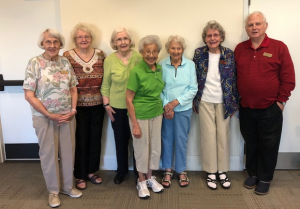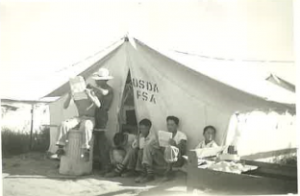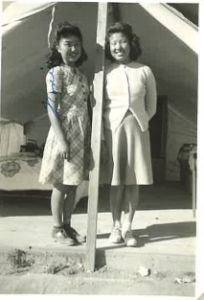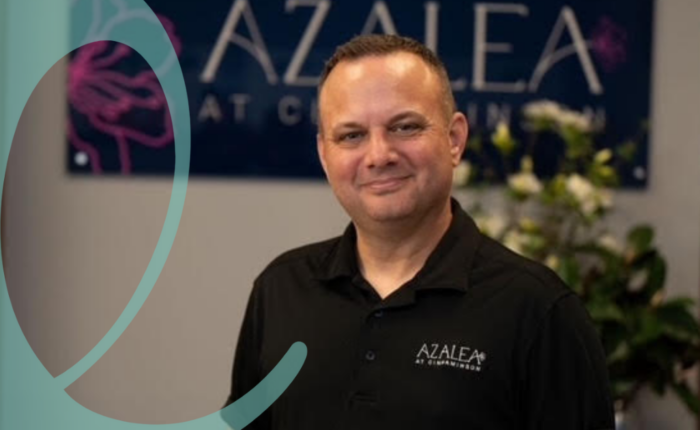
- Our Communities
- View Comments
- Russellville Park
At Russellville Park independent living, assisted living, and memory care community, we know our residents have incredible life stories – and we love to hear them! We have a robust memoir writing group that meets twice a month. Nearly 15 residents assemble to share their stories and support each other’s writing.
 Resident Aya Fujii recently shared her memoir and experiences in a Japanese internment camp during World War II:
Resident Aya Fujii recently shared her memoir and experiences in a Japanese internment camp during World War II:
In 1910, my parents were one of the very first Japanese families to settle in Hillsboro in Washington County, Mother did not speak much English and Dad spoke just enough to get by. Our oldest brother at age 27 did all the legal work and translation.
I was 14 years old when WWII began. I was a freshman at Hilhi, the high school in Hillsboro. There were a couple of other Japanese students there, also. My sister Taka was supposed to graduate in the Spring of ’42. In February of 1942, President Roosevelt signed executive order 9066 which was an order to remove all people of Japanese descent to the interior part of the U.S. We were instructed to leave by May 22nd. Like many families, we were just recovering from the great depression and our parents had just built a 5-bedroom house on their 50-acre farm. Although it was not quite finished, our parents wanted us 5 girls, my brother, and his new wife to move in. Our 2 older brothers were already serving in the U.S. Army.
 My brother was able to find a renter for the house; a physician and his wife and 2 young children. We had to store all our belongings in a couple of rooms upstairs – thinking back, it must have been a nightmare for our parents to the May 22nd deadline. All the farm equipment had to be stored, the strawberries were ripening and needed to be picked and sold. But our good German neighbors took care of everything.
My brother was able to find a renter for the house; a physician and his wife and 2 young children. We had to store all our belongings in a couple of rooms upstairs – thinking back, it must have been a nightmare for our parents to the May 22nd deadline. All the farm equipment had to be stored, the strawberries were ripening and needed to be picked and sold. But our good German neighbors took care of everything.
“Only what we could carry” became the slogan for the evacuees. So, our mother took us to J.C. Penney’s and bought each of us 2 suitcases. They weren’t fancy, they were made of hard cardboard-like material. We were instructed to put our initials in large letters using white paint. It was not like we were going on vacation; we were to supposed to pack essentials, but I remember packing all my party clothes and all the “good stuff”. Mother sewed a large duffel bag and filled it with sheets and towels.
On the morning of May 22nd, our neighbor drove us to the Forest Grove bus station where all the Japanese from Washington County were assembled. There we boarded several greyhound buses and were driven to the Portland Livestock Exposition Center. I remembered the place well – in grade school we were given a field trip to watch the rodeo from the stand, it was a fun, carefree time. When we arrived at the expo center, we were all assigned family numbers on a tag that we were supposed to wear at all times. We were assigned 3 stalls: one for our parents, one for my brother and his new wife, and one for us girls. The stalls were former horse stalls that were hastily whitewashed. Animal hairs were sticking between the slats and needless to say, the stench was overwhelming. We had to fill our own mattresses with straw for our canvas cots and just had a drop cloth for a door. There was no ceiling so the sounds from your neighbors were very disturbing. There were approximately 3500 to 4000 internees as the assembly center all from the western part of Oregon and Washington.
 There were 2 shifts for every meal, of course, the menu was very foreign especially for people like our parents; lots of mutton and hash. One of the disturbing things that were taking place was the family structure was falling apart. All the kids were making friends and were taking their meals elsewhere instead of with their families. There were some organized activities going on in the center, but at 3 weeks, our parents were pretty disillusioned.
There were 2 shifts for every meal, of course, the menu was very foreign especially for people like our parents; lots of mutton and hash. One of the disturbing things that were taking place was the family structure was falling apart. All the kids were making friends and were taking their meals elsewhere instead of with their families. There were some organized activities going on in the center, but at 3 weeks, our parents were pretty disillusioned.
Fortunately, there was an urgent call from the Eastern Oregon Farm Labor Bureau that they needed workers to help in the sugar beet and onion fields. So once again, we packed our meager belongings and with several other families, rode the midnight train to Ontario, Oregon. The shades were pulled down and an armed guard stood to watch for any disturbances.
When we finally arrived in Nyssa, we were issued 4 large canvas tents with large letters FSA printed on the side. The letters stood for Farm Security Administration. One tent was for my brother and his wife, one for my parents and 2 younger sisters, one was for my 2 other sisters and me, and the 4th tent was to be used for cooking and meals. Fuel for heating and cooking was coal which we had to gather from a large stockpile. Each tent had a canvas cot and one light bulb hanging from the center. The floor was wooden with open slats that brought in weeks and insects. We opened the front of the tents in the heat of the summer and that meant anyone could see right through and at night, the shadows could be seen.
There were about 100 tents set up in rows. Each morning, the farmers would come into camp and recruit workers. Many of the internees had never worked on a farm before but it was better than languishing in the assembly center.
At the age of 14, I went with my mother and other ladies to weed onions and thin sugar beets – talk about stoop labor. As the weather turned colder in September, we moved about 12 miles south to a camp in Adrian. There we were housed in barracks, an old CCC camp which seemed like a luxury after living in tents. One of the ironies of the war happened one day while we were working in the fields. An army truck came onto the field and a U.S. Soldier jumped out of the back followed by 12-15 young blonde men, probably in their 20’s. They were German POW’s (prisoners of war). They were sorely needed to work in the fields because of the help shortage. At the end of the day, the farmer treated them to watermelon which they ate with gusto.
As school started in September, I went to Nyssa High School which was about 10 miles away. A school bus cam into camp, we weren’t sure how we were going to be treated but we did make a few friends. I had become good friends with one girl in class but one day, the friendship ended; her brother was killed in the Pacific.
I graduated from Nyssa High in 1945. The war ended in August of 1945 and in September, I enrolled at OSC which it was known then. I was the first in the family to cross over the restricted zone with was Central Oregon. Our family moved back to Hillsboro in October. On Thanksgiving break, I took a bus from Corvallis to Portland, and Ed, who is my husband now, picked me up and drove the 2 lane Canyon road to Hillsboro. Landmarks had changed and we passed the old family farm, so we had to backtrack and finally found our house.
It was a long 3 years to be away, but it felt good to be home again.
Find a Leisure Care Community
Better with age, exceptional with us! Come and see how Leisure Care communities are helping seniors rediscover (and sometimes reinvent) themselves.





